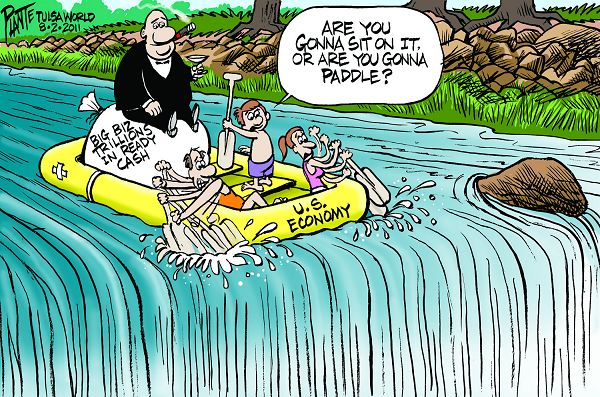Any idea why the Dow Jones was down 513 points today? (August4)
The pundits are are attributing the huge drop to loss of faith in our government's inability to govern effectively.
Nah, we're probably just realizing that 3 years of 0% interest rates is COMPLETELY unsustainable.
I don't want to put a date to it, but there will be another crash soon.When you pass a gutless, meaningless package like the one they did, what else could the markets think? They see there is no backbone to do what has to be done. The ponzi scheme is unraveling. No where to hide, no where to go.
More than likely expresses the markets feeling about the debt deal. Nonsense.
It's worldwide, well in the West anyway. We're all doomed. We spent too much. We don't make anything. We're living on credit.
American debt, European debt. No American growth, no European growth.
If I were a doommonger I'd say it's all about to collapse but I have my fingers crossed that something good happens. God knows what.
I know. Raise taxes. Or lower them. Something like that.
We're doomed.It's not so much that we're living on credit, so much as we're paying that credit off with make-believe money.
That's not true anyway Mark Ewbie... you'll see markets at 14000+ levels (DOW) within a year... along with a substantial rise in all the other markets (US, Europe, Asia). Any clue why, OK guys market secrets "are and will be" kept as secrets by market participants for their own sake!

That may have a play, but from what I've read, investors fear the overall slow economic growth on a global scale, along with the European debt crisis.
This is from NYTimes.
http://www.nytimes.com/2011/08/05/busin … r=1&hp
an excerpt from the article:
A fear haunting markets is that the United States economy may be heading for a double-dip recession. And even after a second major rescue package for Greece and the agreement to raise the debt ceiling in the United States, investors are concerned that world leaders have not done enough to address fragile underlying economic growth, while Europe’s debt problems have moved on to the much bigger economies of Italy and Spain.
and another:
Jean-Claude Trichet, the president of the E.C.B.(European Central Bank), said the bank had acted in response to “renewed tensions in some financial markets in the euro area.”
He said that uncertainty created by the debate in the United States to raise the debt ceiling had unnerved European markets as United States investors had become increasingly reluctant to lend to European banks. “It’s clear the entire world is intertwined,” he said. “What happens in the U.S. influences the rest of the world.”On the other hand, the decline might be overdone and offering a buying opportunity for anyone with any cash lying around. Who knows?
Hey Ralph, the only people with money to spend on the buying opportunity would be the upper 20%. Almost all of the rest are barely making ends meet or not even that.

I have 0 income right now, but **because I've saved money in the past ** I can afford to buy stocks.
So... nope, you're incorrect.
I saw the title of this thread and went directly to check out CNBC. I watched for a few minutes to see what they were saying and apparently the claim is that the America economy is beginning to slow even further.
Unfortunately, all the growth the economy supposed had came directly from Wall Street and not from the consumers themselves.
More people have less money to work with and with that trend continuing, then the economy isn't actually going to see growth of any kind of value.
However, I am not surprised by this and have been saying it all along, that the government's intervention was meaningless, as it has been for the last couple hundred years.
They continue to inject money into the economy, but fail to spend it properly, which is why things only appear to get better, but do not actually get better.
Paul Krugman is very pessimistic about the economy in his column this morning and quite critical of the Obama administration, the Federal Reserve and the Republicans in Congress.
"And why should we be surprised at this catastrophe? Where was growth supposed to come from? Consumers, still burdened by the debt that they ran up during the housing bubble, aren’t ready to spend. Businesses see no reason to expand given the lack of consumer demand. And thanks to that deficit obsession, government, which could and should be supporting the economy in its time of need, has been pulling back."
http://www.nytimes.com/2011/08/05/opini … r=1&hpPaul Krugman is another Keynesian idiot. It is his believe that the state is the most efficient user of resources and that busts can be ameliorated by reinflating bubbles. How STUPID is he? If the bubble had been allowed to burst in early 2008 when Bear - Stearns was in trouble, when GWB and the Democrat congress passed the very first bailout, and the economy was allowed to stabilize on its own without the GWB bailout we would have had a recovery already instead of facing the second tier of this slide to oblivion.
Krugman's recommendations would just sink it all, faster. He is a fool.
I am wrong. Krugman, as a Keynesian, is making recommendations that have been disastrous every time they are tried and he expects that this time there will be a different and better outcome. I am wrong he isn't stupid, he is insane.Krugman has been predicting for two or three years exactly what we are experiencing now. Too bad Congress and Obama didn't listen to him.
Are you nuts? Yeah, Krugman has been "predicting the mess we're in" because he's been demanding that government SPEND EVEN MORE MONEY
He thought the bailouts were too small!! He thought that QE1 and QE2 were too small!! He wanted the debt ceiling to be raised without cutting spending!!!
THE MANIAC HAS NO UNDERSTANDING OF HOW MONEY WORKS!!
Krugman gives economics a bad name. The guy, not in so few words, wants the US to print a $10 Trillion dollar bill and blow it on bailing out banks!!
The man is loony. Absolutely daft.
There's another economic school of thought that has been predicted EVERY major fiasco of the economy for about a century...
... but they're just a "cult", aren't they.
Ron Paul predicted the housing boom back in 2003.
Google "Peter Schiff was right", and watch Reagan's economic adviser and creator of the "Laffer Curve" laugh in the face of an Austrian Economist... who was unfortunately proven right.Krugman has predicated his predictions on a failure to spend enough to stave off the down turn. This is a Keynesian notion of how economies work. Krugman wanted the initial stimulus to be on the order of $2 trillion. He has maintained for years that FDR didn't spend enough and that is why the depression lasted as long as it did. Krugman is idolized by those who place their faith in a centralized economic authority. He and they are idiots.
An economy cannot be steered any more than the sand floating in the surf can be steered. His idea is that a centralized authority inflating away the value of currently held assets by spending nonexistent money is just foolishness. Money is not just an entry on a ledger but a real thing and when government waves the spending wand it devalues dollars currently held.
Krugman's answer to economic trouble is to water down the value of money and sow the seeds of uncertainty into all future economic decisions. The result of what Krugman would have is what you see. It is easy to predict disastrous results when those results are part of your own economic philosophy."An economy can't be steered."
Not true. Bush steered ours into the ditch.And some might say intentionally driven, by Obama, into a swamp. When you blame Republicans in Congress for the current set of circumstances, as you or another like you invariably will, recall which party controlled both houses of Congress from January 2007 until January 2011. It is not a coincidence.
As for GWB you can have him. His understanding of economics more closely resembles that of Obama than that of any conservative. Don't conflate Republican with conservative. Though not mutually exclusive membership in one category does not imply membership in the other.
It looks like the American public gets to bailout the politicians and their find decision making skills now!! Thanks a lot guys!!
If they spent the at least 3 trillion for
war on us citizens instead the streets would be paved with gold.I don't suppose you guys noticed but London was down 3% odd as well and we don't care so much about US politics. This is about growth and debt - in Europe and the US.
It looks like the Euro is going to collapse and possibly another round of bank failures in Europe. I know. Who cares!
Well that's 'our' problems. We can't afford to cover the losses if it comes to the crunch.
Similar to the US. You can't afford to cover that debt if the Chinese stop buying it.
It's all a bit of a mess really. Governed by politicans who look two years ahead to the next election round, while we really need a bit more continuity.
My suggestion is that everyone crosses their fingers and makes a wish.That shitty deal everyone knows is going to sink our economy even further after Obama and his boy's blow there way through the next couple trillion.
That actually depends solely on how it's put to work. If they just repeat the same pathetic actions of the past, then it's going to tank the economy worse than it is now.
Unfortunately, the lies coming from politicians about the growth of the economy to begin with are still being covered up by all politicians.
America didn't enter a recession when the economy collapsed, it entered a depression, unlike anything ever seen. But, to tell the public that would have caused a run on the banks, where people would have literally taken their life savings out of the institutions and every bank would have collapsed. Hence, why the politicians took the tact that they did...lie to the public.
It's truly sad how uninformed the public is.
This drop is not caused by Washington though they didn't help over the past 2 weeks. Fear has come back that the world economies are slowing and could go back into recession. Most of the economic indicators over the past 3 weeks have been negative, showing all economies slowing. Since the market is foward looking approximately 6 months, people started getting scared. With each economic report, they got more scared and it turned into panic yesterday morning and again today.
Tomorrow's Jobs report will be a big market mover one way or another.21st July the world suddenly discovered that world economies could be in a recession... lol... this sell off is an "August" phenomenon... S&P will come out at the end of August saying that they're not cutting the triple A credit rating of US. And the short covering rally starts... no gloom and doom... everything is fine! DOW will bottom out in 10300 - 10800 range.
PS: August is the most illiquid month for stocks in the US you know!
Probably has not much to do with the present subject however....
http://usdebt.kleptocracy.us/How long could they trade paper upward before a correction? There is no consumer activity because the the disposable money people had went to $4 gas,$15 cans of coffee, $4 loaves of bread,,,,,,,you can only get so much blood from a stone....
You are exactly right. Most of the politicians and most of the people in the USA want to keep making out like we don't have a problem when the problem is very large and out of control. The middle class is quickly going away and for the most part the politicians neither Republicans nor Democrats give a damn. They want to keep the rich rich and take from the middle class. It will take a peoples revolution to ever change anything for the better in the United States, The debt ceiling was only the tip of the ice berg. Wake up America. Its much later than you think.
We don't have the solidarity say Egypt had,it will go well into the bottom of the ninth before this country say's,,Whoa,we need to do something.A lot of us know but talk to someone at work or on the street and they are more concerned with what some putz said on twitter.
Me hopes all this isn’t indicative of our future ad revenue…
Interesting that the 'correction' that the US govt took action on to bailout the banks and ailing industries in America has taken 3 years to start to finally unravel.
If the govt had allowed it to actually happen the US economy would be well on their way to recovery.
This is what you get when you have a 'free market' with few or little regulations.
Now the govt has raised it's debts ceiling that goodness knows how long until if needs to pay back it's owings.
The US govt better hope the Australian economy doesn't tank, otherwise China is going to ask for it's loaned out money back.
I have little care for the politicians of the USA but it's people are in for a world of hurt potentially worse that could make the 1920's depression look like a joke.I know that Ralph still thinks that The Austrian School of Economics is a "cult" of people who "worship" Mises, but even he will have to admit that the Austrians have been predicting all of this years in advance.
Here's an article by Jeffrey Tucker outlining how the Austrians all claimed that the bailouts would only lead to more trouble.
http://mises.org/daily/5512/The-Austria … -Yet-Again
I would like to remind everyone that people like Paul Krugman had argued that the bailouts needed to be bigger and more dramatic which is clearly nonsense. The Keynesians have been disproven AGAIN.
Here is another article discussing the idiotic solutions that people proposed to let Obama SINGLE-HANDEDLY "solve" the debt-ceiling crisis. We'll be hearing these arguments in 10 or so years from now.
http://mises.org/daily/5515/Saved-by-a- … ollar-Coin
It's hilarious to see that these arguments are JUST like the $1 Trillion bill that Mr. Burns had in the Simpsons -- only, when the Simpsons did it, it was obviously an idiotic idea.
http://en.wikipedia.org/wiki/The_Trouble_with_Trillions
That's right, America. The idiots trying to run your economy are stupider than the Simpsons. Paul Krugman won a Nobel Prize for regurgitating the exact idiocy found in a Simpsons episode.Well, what's Mises recommendation to turn the economy around? Apply the Herbert Hoover approach of when you're in a hole, keep digging?
Where Hoover used a shovel FDR used a backhoe. The multiple attempts to take over the labor market, tightly govern commerce, imposing a regulatory state and forcing participation in the Social Security ponzi tax - all of which our economy still struggles under - held down the productive sector and the creation of real wealth until after WWII.
FDR was a disaster, he sowed the seeds of our current problem in the 1930 and it has been well watered ever since by cowards afraid to restructure or, better yet, eliminate Social Security. If Bernie Madoff deserves a hundred years in prison for stealing $5 billion, FDR's dead body should occupy the cell next to his for the next 1000 years.
The demographic iceberg that has been drifting our way, and clearly spotted in the 1980s, has arrived and Republicans and Democrats are cowards and refuse to face it. The ship of our economy is sinking under a publicly compelled collision with a publicly created monster. We deserve the government we get. Better learn to speak Hindi because we will all be working for Indian companies before long
It is the brilliant promise of leftist, liberal, democrat, socialist welfare Keynesian economics that has caused all of this. And those idiots are going to do it again with some stupid, half assed "jobs" bill like the WPA.
All FDR did was keep the Fascists from destroying America - why should they have the fun.I'm not exactly sure what you think Hoover did, but EVERY SINGLE New Deal policy enacted by FDR was nothing more than an expansion of a previous Hoover policy. Before FDR, Hoover had enacted the largest government spending program ever.
Mises demands we quit printing money, return to competitive money, get the government out of the industries, quit bailing people out, let the individuals decide how to spend their own money, and return freedom to the populace.
It's impossible to NOT see how this is the correct solution.
Krugman: "Let's print $10 trillion out of thin air, and then give it to banks!"
Mises: "Government needs to stop bailing people out, quit printing money, live within its means, and return the sovereignty to the consumers".
I'll let the readers of the forum choose which they'd prefer!
ATTENTION READERS OF THIS FORUM!!!!
ATTENTION FELLOW HUBBERS!!!!!!
Which of the following solutions do you prefer:
(1) Reply with "Krugman" if you think the US should print $10 trillion to spend as our government sees fit.
(2) Reply with "Mises" if you think that the US should stop borrowing money and cut spending.
Please vote!!!Hoover curled up in a fetal position. The actions he finally took were "too little, too late."
Krugman is correct.
Cutting spending now would be suicidal.Really? You're gonna make me dig out my books and articles to show you that you're completely wrong?
We can only WISH he had done nothing.
Here we go!
Hoover did the following to combat the then-not-such-a-great-depression:
... oh, look at that: Mises.org has the entire rebuttal for free online!
http://mises.org/media/2046/Herbert-Hoo … Depression
There ya go. I love that they don't believe that intellectual property is possible.Here's Wikipedia's take on Hoover and the Great Depression;
Hoover's stance on the economy was based largely on voluntarism.[39] From before his entry to the presidency, he was a proponent of the concept that public-private cooperation was the way to achieve high long-term growth.[40] Hoover feared that too much intervention or coercion by the government would destroy individuality and self-reliance, which he considered to be important American values. Both his ideals and the economy were put to the test with the onset of the Great Depression. At the outset of the Depression, Hoover claims in his memoirs that he rejected Treasury Secretary Andrew Mellon's suggested "leave-it-alone" approach, and called many business leaders to Washington to urge them not to lay off workers or cut wages.[41] Lee Ohanian, from UCLA, has argued that Hoover adopted pro-labor policies after the 1929 stock market crash that "accounted for close to two-thirds of the drop in the nation's gross domestic product over the two years that followed, causing what might otherwise have been a bad recession to slip into the Great Depression".[42] This argument is at odds with the Keynesian view of the causes of the Depression, most recently by Brad DeLong of U.C. Berkeley.[43]
Calls for greater government assistance increased as the U.S. economy continued to decline. Hoover rejected direct federal relief payments to individuals, as he believed that a dole would be addictive, and reduce the incentive to work. He was also a firm believer in balanced budgets, and was unwilling to run a budget deficit to fund welfare programs.[44] However, Hoover did pursue many policies in an attempt to pull the country out of depression. In 1929, Hoover authorized the Mexican Repatriation program to combat rampant unemployment, reduce the burden on municipal aid services, and remove people seen as usurpers of American jobs. The program was largely a forced migration of approximately 500,000 Mexicans and Mexican Americans to Mexico, and continued until 1937. In June 1930, over the objection of many economists, Congress approved and Hoover signed into law the Smoot–Hawley Tariff Act. The legislation raised tariffs on thousands of imported items. The intent of the Act was to encourage the purchase of American-made products by increasing the cost of imported goods, while raising revenue for the federal government and protecting farmers. However, economic depression now spread through much of the world, and other nations increased tariffs on American-made goods in retaliation, reducing international trade, and worsening the Depression.[45]
In 1931, Hoover issued the Hoover Moratorium, calling for a one-year halt in reparation payments by Germany to France and in the payment of Allied war debts to the United States. The plan was met with much opposition, especially from France, who saw significant losses to Germany during World War I. The Moratorium did little to ease economic declines. As the moratorium neared its expiration the following year, an attempt to find a permanent solution was made at the Lausanne Conference of 1932. A working compromise was never established, and by the start of World War II, reparations payments had stopped completely.[46][47] Hoover in 1931 urged the major banks in the country to form a consortium known as the National Credit Corporation (NCC).[48] The NCC was an example of Hoover's belief in volunteerism as a mechanism in aiding the economy. Hoover encouraged NCC member banks to provide loans to smaller banks to prevent them from collapsing. The banks within the NCC were often reluctant to provide loans, usually requiring banks to provide their largest assets as collateral. It quickly became apparent that the NCC would be incapable of fixing the problems it was designed to solve, and it was replaced by the Reconstruction Finance Corporation.
By 1932, the Great Depression had spread across the globe. In the U.S., unemployment had reached 24.9%,[49] a drought persisted in the agricultural heartland, businesses and families defaulted on record numbers of loans, and more than 5,000 banks had failed.[50] Tens-of-thousands of Americans who found themselves homeless and began congregating in the numerous Hoovervilles (also known as shanty towns or tent cities) that had begun to appear across the country. The name 'Hooverville' was coined by their residents as a sign of their disappointment and frustration with the perceived lack of assistance from the federal government. In response, Hoover and the Congress approved the Federal Home Loan Bank Act, to spur new home construction, and reduce foreclosures. The plan seemed to work, as foreclosures dropped, but it was seen as too little, too late.Your article naturally assumes that the federal government could solve these issues. It's a biased argument: "Too little, too late".
Your citation also shows that Hoover created a home loan bank act, a halt in reparation payments, he created a credit corporation to bailout banks (this program turned into the RFC, as wikipedia points out as well), he also kicked Mexicans out of the US (i was unaware of this one until you brought it up...), and increased tariffs.
That ain't "curling up in a fetal position", that was the biggest intervention into the markets ever seen during in US history.
Also, wikipedia ignores the rampant monetary inflation that was happening throughout the 20s, which is a central point in the Austrian view.
Ralph, QE1 and QE2 both failed to do ANYTHING to help the economy. Neither did the bailouts, and neither has the 3 years of 0% interest rates.
If this situation can't convince you that Krugman is wrong, then I'm afraid you just can't refer to Austrian economists as "religious cultists" without being a hypocrite.
Here's an entire website dedicated to pointing out Krugman's inaccuracies.
http://www.krugmaniswrong.com/Watch as the US bond rating is down graded because not enough was cut in the bogus budget deal and see what suicide looks like.
To reiterate, Krugman is a foolDamned right he is.
I'm disgusted that people are demanding a QE3 already -- here on Hubpages!! People are actually WANTING the Fed to print trillions out of thin air!!
When the Simpsons say it, it's obviously idiotic:
http://en.wikipedia.org/wiki/The_Trouble_with_Trillions
When Krugman says it, it's a Nobel Prize winning material.
--- Krugman is dumber than the Simpsons.News coverage of S+P's downgrade come 45 minutes before this posting.
Hey Ralph, your question of "what would the Austrians do" is answered in this fun video.
I'm pretty sure you'd be one of the few on Hubpages to understand it.
http://www.youtube.com/watch?v=GTQnarzm … r_embedded
Also, in my latest hubs ("Stop the Nonsense" and "Stop the Nonsense, Again") I basically put up my fight against the Keynesians.The mere question "what would you do about the economy" shows that the person asking doesn't understand how economies work.
"There's no 'it' at all".
It's Hayek and Mises' "pretense of knowledge": a few people think that they can know how to fix the economy, but they don't realize that the economy is just billions of people working to suit their own interests.
Seems like quite a few out there agree on your assessment of it having been a Depression rather than a recession, Cagsil:
http://www.dailymail.co.uk/debate/artic … slump.htmlthis may be a stupid question but WHO do we owe money to? what and why have we borrowed for?
let's see... we've borrowed hundreds of billions from China to attack Iraq and Afghanistan...
We've borrowed money from Europe to protect Europe...
We've borrowed Money from Japan to use to secure oil lines for Japan...
... yeah... this crap is happening.
Do you really want trillions of dollars to suddenly flood into the system?
The issue is the irrationality of political economy. This is unlikely to change. As we saw with the resent "deal" neither party's leaders are willing to unwind government from the economy. The trillions held by business would not likely flood back in because of reasonable distrust of government.
Liberty and a sound money system go hand in hand.
Demand Ron Paul in 2012.
"There is always more misery among the lower classes than there is humanity in the higher."
Victor Hugo (1802 - 1885), 'Les Miserables,' 1862- PrettyPantherposted 14 years ago
0
I no longer care about the ridiculous money games of nervous investors and the breathless attention our media gives to every little twitch of their cowardly manipulations.
I long ago removed my money from the game and am much better off for it. You may find Computers have a hand in what appears to be a market Meltdown.
Electronic Traders who set automatic trigger points when a stock hits a paticular number 'SELL !' This starts an electronic Cascade that whips round the world in seconds causing wide spread panic.
Ain't technology wonderful.... Least it would be if it wasn't for the fact that these assholes are playing with real money, or to be more precise OUR real money.Rumors: European issue, which is the ripple effect of the earlier US disaster. Likened to the "Panda Effect" this spring-summer.
Not So Much: Good friend, and CFO, of a major investment firm here in NY, attributes it to normal sell off, in lieu of the end of summer, heavy vacation month and the holiday upstart.
Someone mentioned about people spending too much, which is ridiculous. People should spend more, to revolve the currency cycle. Sadly, the wealthier households are actually holding back spending, while yes, the not so wealthy spend beyond their means -out of necessity, more than leisure. IMO.
If people do not borrow, institutions cannot lend -or credit; in turn cannot profit from both defaults and deposits -sending them into yet another spin cycle. Banks used to use the expected collateral and interest of loans, plus revenue from deposits, to balance the debt purchases. But we saw how that went not long ago. Keep in mind, institutions can only lend so much to one another, in an attempt to keep the Fed Fund Rate stable and keep the inflate-deflate bubble from imploding or exploding. It is twisted how debt is a major factor in the stability of Western economy.
James.Who are you kidding ?Actually the un-necessary run up in commodities has siphoned off the working classes disposable income.Let the wealthy spend,they are the ones who ended up with the money.Another millionaire fund manager, go shopping ,help the country that made you rich.
This is fallacy. Certainly the increase in petrol cost-not supply-has caused the COM to go up, but not as high as it did back in the 70s, in the states. People cry high prices, not realizing a gallon of milk is equal to a gallon of fuel (about $3.50). What has been played is a very bad card, pushing the 'common millionaire to be' into a credit situation, again. Remember 1978? Same thing. Then the 80s exploded with instant millionaires, money for everyone, as prices dropped sharply, allowing wealthy folks to hide assets and the new money folks to spend it.
The 'blue chip/collar' concept isn't what it used to be. The fallacy of the rich get richer and the poor get poorer is hackneyed, for lack of a better word. Certainly, the wealthy could do a bit more spending. Keep in mind, without debt, the West wouldn't have an economy. They have the largest global bond, mortgage, lending system even known to man. If they turned all debt to credit and profit, called in all the markers out there, the global system would go belly up in seconds. Ironically, people are investing yet again in bad paper and debt/insurance securities. Same thing will happen again, and this time it won't be Too Big To Fail.
...imo...If you think that spending will save our economy...
... then g'head and blow all your money!
(Savings is the answer - savings lowers the interest rate in a sustainable fashion, and increases investment).It depends what you mean by "save the economy". In the short term, spending will indeed make everything appear more rosy. More spending means more consumer goods are being bought and more money is being spent on running businesses and on government projects. So in the short term, nobody loses their jobs and it looks relatively good - on paper anyway.
The question is what is going to happen long term.
Also, the way that the fractional reserve banking system is set up is that it's DESIGNED to encourage borrowing - otherwise, how would the bankers cream off a percentage and make the money they do? But you already know that, so I'm preaching to the choir.
As someone who once had some scientific education aeons ago, it always makes me laugh when people say things like "spending more has been proven to help the economy" (usually citing something like Roosevelt's New Deal as an example). Statements like that can't be proven (or to put it better, they can't be falsified) by any scientific tests. How do we know that the American economy wouln't have recovered faster if Roosevelt *hadn't* done what he did? After all, we never had a control for that did we?
In the end, most economists and politicians seem to use their innate biases to "prove" their points rather than trying to look at things objectively.This is one area that clearly delineates the difference between liberal and conservative. The liberal must work toward the establishment of a utopian vision. An economic philosophy that teaches an economy can be steered in a desired direction immediately appeals to the liberal. Keynesian economics appeals to the liberal because it places increased power into the hands of a central authority that this fulfills an essential necessity for accomplishing utopia.
So, as liberals all cry for greater interference in the market, greater imposition of regulation, increases in power, taxes and spending, the conservative calls out for the exact opposite. The conservative vision is one in which the individual is free to act within a social structure not a political compound. The market depends on billions of economic decisions made by hundreds of thousands of actors, according to conservative economic thought, not the hundreds of decisions made by a central board of economic directors.
Which appears more rational a complex system allowed to be complex and run as complex as the nature of which it is part or an economic system that is compelled to be as simple and manageable as possible. We have seen the simplified economy in its most complete form in the old Soviet Union with massive inefficiencies and continual shortages.The market did what it wanted and look at us now.You seem to want to make something more complex than it is.. Wall St and the banks played both ends to the middle and got burnt. We the people had to bail them out. I am old enough to remember the Countrywide commercials,Refinance, Refi now,put cash in your pocket. WTF? They made crap loans so they could get fees, then repackaged them as AAA investments.They were Junk. Remember Michael Milken,the junk bond king,he got pinched,,oh yeah, that was back when there were REGULATIONS.
The market has been distorted for decades by agencies like Fanny Mae and Freddie Mac or by regulations that never go away but take different forms. It is a lie that the free market has done all of this mischief without the abdication of responsibility for money instruments by Congress and massive distortions created by interference in the market.
If Congress never created FHA, Fanny Mae, Freddie Mac and all the rules and regulations around mortgages bad mortgages would never have been written. If Congress hadn't permitted the creation of monetary instruments by non-Congressional agencies it abrogated one of its fundamental, Constitutional responsibilities.
Economic problems arise when government abandons its real responsibility to maintain predictability. Its other responsibilities in the economy is to insure the agreements between individuals in free trade are free of force or fraud. This can mean establishing a system of contract law or require that the contents of a consumer product be guaranteed.
Beyond this a government begins to interfere and ours has to the detriment of everyone.
Have you studied the Austrian Business Cycle Theory?
Because, if not, you're maybe one or two steps short of independently recreating a Nobel Prize winning idea.
You had to have read some Austrian Econ. literature! I thought I was the only one! You're discussing the "pretense of knowledge" and many more concepts foreign to the like of Krugman.Heard of Austrian economics, read a couple of articles online, and have read (and understood about 20% of) a book called The Mystery of Banking by Murray Rothbard, who I believe is part of the Austrian school (although I may be wrong).
Oooh, pretense of knowledge - never heard of that.
http://nobelprize.org/nobel_prizes/econ … cture.html
"Unlike the position that exists in the physical sciences, in economics and other disciplines that deal with essentially complex phenomena, the aspects of the events to be accounted for about which we can get quantitative data are necessarily limited and may not include the important ones. While in the physical sciences it is generally assumed, probably with good reason, that any important factor which determines the observed events will itself be directly observable and measurable, in the study of such complex phenomena as the market, which depend on the actions of many individuals, all the circumstances which will determine the outcome of a process, for reasons which I shall explain later, will hardly ever be fully known or measurable. And while in the physical sciences the investigator will be able to measure what, on the basis of a prima facie theory, he thinks important, in the social sciences often that is treated as important which happens to be accessible to measurement. This is sometimes carried to the point where it is demanded that our theories must be formulated in such terms that they refer only to measurable magnitudes."
In a nutshell, I believe he's saying that the "inputs" (causes/variables) which drive the econonomy are myriad, and economists don't know them all - or to put it another way, they cherry pick certain ones that are directly measurable, without realising that there are other variables which we either don't know about, or aren't measureable, or (this is my bit) will only have a measureable or discernible effect over a very long timescale. And that you can make a broad statement about how "x" varies with "y", but you can't determine which value of "x" results in a particular value of "y" (e.g. which level of inflation results in a particular level of (un)employment).
A bit broader and more comprehensive(!) than the point I was making, but yeah. Spot on.
And a nice analogy from near the end of the lecture:
"A simple example will show the nature of this difficulty. Consider some ball game played by a few people of approximately equal skill. If we knew a few particular facts in addition to our general knowledge of the ability of the individual players, such as their state of attention, their perceptions and the state of their hearts, lungs, muscles etc. at each moment of the game, we could probably predict the outcome. Indeed, if we were familiar both with the game and the teams we should probably have a fairly shrewd idea on what the outcome will depend. But we shall of course not be able to ascertain those facts and in consequence the result of the game will be outside the range of the scientifically predictable, however well we may know what effects particular events would have on the result of the game. This does not mean that we can make no predictions at all about the course of such a game. If we know the rules of the different games we shall, in watching one, very soon know which game is being played and what kinds of actions we can expect and what kind not. But our capacity to predict will be confined to such general characteristics of the events to be expected and not include the capacity of predicting particular individual events."
And, lastly:
"If man is not to do more harm than good in his efforts to improve the social order, he will have to learn that ... he cannot acquire the full knowledge which would make mastery of the events possible. He will therefore have to use what knowledge he can achieve, not to shape the results as the craftsman shapes his handiwork, but rather to cultivate a growth by providing the appropriate environment, in the manner in which the gardener does this for his plants. There is danger in the exuberant feeling of ever growing power which the advance of the physical sciences has engendered and which tempts man to try, "dizzy with success", to use a characteristic phrase of early communism, to subject not only our natural but also our human environment to the control of a human will. The recognition of the insuperable limits to his knowledge ought indeed to teach the student of society a lesson of humility which should guard him against becoming an accomplice in men's fatal striving to control society - a striving which makes him not only a tyrant over his fellows, but which may well make him the destroyer of a civilization which no brain has designed but which has grown from the free efforts of millions of individuals."Rothbard is DEFINITELY part of the Austrian School.
Yeah, you're take on the Pretense of Knowledge is about right. I woke up this morning thinking I'd write an article about it, because it seems to be flagrant in the news anymore - what with the S&P downgrade, and all.
The idea is, basically: Paul Krugman wanted us to print $10 Trillion and give it to banks. Then, when the Fed only printed up $2 T, and nothing got fixed, he claims "Bah, the world would be better if the Fed had the courage to print $10T. But! Things would be worse had we spent nothing!"
Basically, they say they're right when their wrong, and then claim something else when they're wrong when their right... but there's no way to prove it.
IF you're interested in some easy reading in the Austrian Tradition, just about every article I write has a link to such books at amazon. My favs are "economics in one lesson", "defending the undefendable", and "Lessons for the Young economist"
Oh, and for fun, here are two videos of the Austrian, Hayek, rap-battling the king of modern macro-economics, Keynes.
http://www.youtube.com/watch?v=d0nERTFo-Sk
http://www.youtube.com/watch?v=GTQnarzm … ure=relmfu
Who's kool aide are you drinking? If we don't spend anything where will the jobs that are needed for a thriving economy come from? Thin air like the fed?
Modern: in order to debunk your argument, it would take a massive amount of typing. And, on top of that, you'd just ignore what I wrote. If you're interested, check out any of my hubs discussing jobs.
Or, you could read any of the books in my hubs.
Or you could read many of those books for free in .pdf formant.
The best book to read to counter your argument would be "How an economy grows and why it crashes" by Peter Schiff.
Here's "peter schiff was right", a viral video that shows that the economists who are in charge have no idea what they're talking about.
http://www.youtube.com/watch?v=2I0QN-FYkpwLook EmpressFelicity! It's the Pretense of Knowledge!
He assumes he knows that printing up trillions of dollars and giving it to banks will make life better for everyone!
Related Discussions
- 85
Who is responsible for current economic conditions of the United States. Congre
by David Stillwell 10 years ago
Who is responsible for current economic conditions of the United States. Congress or the president?I am interested in your opinions, rants, and factual comments. Have at it people... I value all opinions even if I do not agree with them.
- 27
Who will WIN the American Presidency- Clinton OR Trump?
by Grace Marguerite Williams 9 years ago
Who will WIN the American Presidency- Clinton OR Trump?
- 33
EU Says US Making Fortune From The War And Ruining Their Economic
by Sharlee 2 years ago
Looks like European officials are very dissatisfied with Joe Biden, and his administration. Looks like his policies are taking down Europe too... WEEEEPOLITICO --- Nine months after invading Ukraine, Vladimir Putin is beginning to fracture the West. Top European officials are furious with Joe...
- 14
Can we agree that Washington is the biggest drag on the economy?
by Ralph Deeds 12 years ago
David Wessel in today's Wall Street Journal: Washington is the Biggest Drag on the U.S. EconomyHousing is on its way back. Consumers are spending more readily. Nearly two-thirds of U.S. private industries are hiring. The stock market is up. The U.S. economy is healing, albeit slowly.The...
- 161
Why Do "Conservatives" Have a Worse Economic Record Than "Liberals"?
by Scott Belford 2 years ago
I was working on a different hub and in the process developed the following statistics about GDP growth throughout American history. Since George Washington, whose economic philosophy somewhat resembled those of today's liberals, there have been:- 10 periods where administrations who favored...
- 31
Do you think a Republican will be the next President of the United States?
by Rakim Cheeks 9 years ago
Do you think a Republican will be the next President of the United States?





























